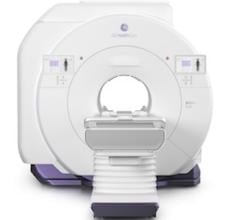
Getty Images
October 4, 2021 — A new paper in the Journal of the National Cancer Institute, published by Oxford University Press, indicates that magnetic resonance imaging (MRI) is cost-effective for detecting breast cancer for women with very dense breasts detected by mammography.
About 10% of women have extremely dense breasts, and current mammography screening guidelines do not recommend additional imaging tests unless there is a strong family history or genetic risk for breast cancer. Such women face two problems. They have increased risk of developing breast cancer. Mammographic screening also tends to be inaccurate in detecting breast cancer for them.
In the United States, some state breast density inform laws require women to be told their individual breast density and the diagnostic implication it has. MRI screening strategies are better at detecting breast cancer in such women. However, an MRI is a much more expensive imaging method.
In this report, the authors used data from a large breast cancer screening trial previously conducted in women in the Netherlands, as well as other established approaches to modeling breast cancer outcomes, to examine the cost-effectiveness of adding MRI examinations to mammographic screening in women with dense breasts. For their analysis, the authors simulated several screening strategies with varying intervals that also included the screening mammography with MRI every 2 years compared with mammography alone every 2 years that had been part of the Netherlands screening trial.
The main outcomes of the study found that screening every two years with mammography alone resulted in the lowest total costs and the lowest impact on survival. Adding breast MRI examination every two years resulted in the highest costs but not the highest gain in quality-adjusted life years. Most strategies containing mammography alone were inferior, due to the limited sensitivity of mammography compared to MRI in women with dense breasts. However, alternating mammography and MRI every 2 years was most efficient. Lengthening the intervals resulted in lower total costs, and only a few cancers not becoming screen-detected. The authors concluded that MRI examinations every 4 years had the lowest incremental cost, but screening with MRI alone every 3 years also had an acceptable cost-effectiveness.
“Mammographic screening is not enough for many women – breast cancer has remained a major cause of cancer death also in women who undergo mammography,” said Christiane Kuhl, M.D., who wrote an editorial to accompany the study. “We know that breast MRI does a much better job – but is also much more expensive. The results of this study show that the additional costs associated with MRI do indeed pay off: Breast MRI is much more effective in preventing death from breast cancer in women with dense breasts, and its additional costs are more than compensated for by its improved effectiveness.”
For more information: global.oup.com/


 February 20, 2026
February 20, 2026 









